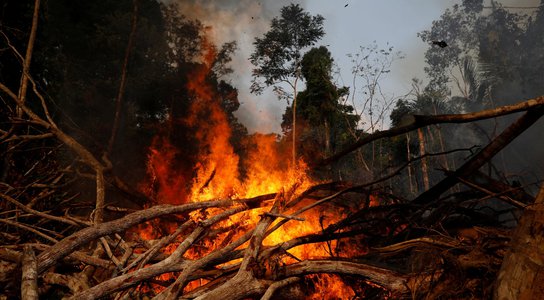- Planned rubber plantation on Papua New Guinea’s Manus Island is a highly likely front for illegal logging, Global Witness investigation reveals.
- Indigenous people promised economic development by Malaysian-owned company, Maxland (PNG) Limited (Maxland), fear they have been cheated.
- Maxland’s controlling company has a track record of destroying forests after empty promises of development.
- Destruction of key biodiversity hotspot linked to financial institutions based in Malaysia, Singapore, Norway and the US.
- ‘Illegal’ timber from the operation exported to China and Japan.
“I want this development to be done properly,” said Eddie Kalai, voice thick with emotion. “According to the law of the land and the environment. According to the resource-owners’ need.”
The stocky village spokesman stood on the southern coast of Papua New Guinea’s Manus Island. The white sands and azure sea here make Pelipowai village an idyllic setting for the tale of exploitation about to unfold. For Mr Kalai was describing a logging project apparently masquerading as a rubber plantation development that sowed false hope among an impoverished community - before dashing it completely.
This is the story of how a complex web of companies and shady players, propped up by global financial institutions and lax regulations in superpowers such as China, is destroying climate-critical forests essential to local communities, biodiversity and the wellbeing of our planet.
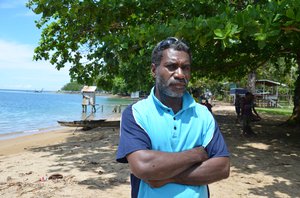
Eddie Kalai: 'I was very worried. And I was praying.'
Pelipowai and its neighbouring villages are sandwiched between the rainforest and the Bismarck Sea. The only way to the market at Lorengau - Manus’s port and tiny provincial capital - is by boat, which takes two hours each way. Villagers who do not have the fare are effectively marooned.
Coastal community members argue that a road to the town is the best chance to improve their lot. So when Malaysian-owned logging company Maxland (PNG) Limited agreed to build part of that road, while replacing the forest with millions of rubber trees in a plantation locals could work on, it was a tempting proposition for some.
Maxland got the better deal: a single tropical hardwood tree can fetch over a thousand dollars on international markets, while the royalties and levies Maxland was offering the community came to less than $45 per tree of the same size. As of October 2019, the company had declared log exports from the project worth about $1.85 million, (shown in log export monitoring monthly report October 2019 to the Papua New Guinea Forestry Authority; December 2019.)
But in a country where almost 40% of the population survives on under £1.5 per day - below the international poverty line – indigenous communities may lack the capital to launch economic activities of their own. And the Papua New Guinean state is virtually absent in rural communities, with infrastructure and critical services often poor or non-existent. As Mr Kalai agreed, when someone is drowning they will grab hold of any log they can. Even if it may sink.
“I was very, very worried.” Mr Kalai’s voice trembled as he recalled how Maxland first began breaking its promises. “And I was praying, if only somebody could come here and get my views as to what is actually happening on my land.”
So what were these commitments? Project documents obtained by Global Witness stated Maxland’s “main focus” on Manus was to “establish a reliable transportation network, alleviate poverty and improve living standard [sic] of its local populace” (from the Maxland (PNG) Limited. Annual Development Plan (2018-2019), Pohowa Integrated Agro-Forestry Project). To that purported end, thousands of trees have already been torn out of their forest, but it is unclear how, or whether, community members have benefited. There are conflicting reports about whether any rubber seedlings have been planted. When we visited the island in October, 2019, none had been. A local contact confirmed in April, 2020 that this was still the case. The National Rubber Board stated that planting had begun, but this could not be confirmed. The sought-after road remains a far-off dream.
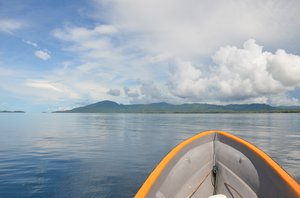
Landfall: it takes more than two hours by speedboat to reach Pelipowai
Enter Thomas Hah
Mr Kalai was speaking at a public meeting in a small open-air market called to discuss the crisis and attended by Global Witness. On the village outskirts, a towering wall of green erupted up towards the sky: the Central Forest, some 70,000 hectares of tropical hardwoods. It is the largest remaining tract of rainforest in the Manus archipelago, according to the Wildlife Conservation Society. This bounty is what lured Maxland supremo and international businessman Dato’ Sri Thomas Hah Tiing Siu (Mr Hah). As we shall see, his web of business interests encompasses firearms and advising on the facilitation of cryptocurrency trading, spreading out from China and Hong Kong to secrecy jurisdictions such as the Cayman Islands.
Manus is a good place to operate under the radar. The site of decisive World War II battles, more recently the island became infamous as the home of a punitive Australian refugee detention center. Some five hundred miles north of the capital Port Moresby, it can only be reached by limited flight options.
Papua New Guinea’s exceptional biodiversity encompasses at least six per cent of all species on Earth. Manus is a biodiversity hotspot even by those standards.
The International Union for Conservation of Nature, a global authority on the natural world, considers the island to contain two key biodiversity areas. Its endemic species—those found nowhere else on earth - include a brilliant green tree snail used to make jewelry and the Manus chauka, a friarbird that adorns the provincial flag. Manus’ biodiversity includes the Admiralty cuscus, unique to the archipelago and the Manus masked owl. From the air, the forests that shelter these animals look almost unscathed. However, close up, the red of logging roads carves up the green.
Divide and conquer
Papua New Guinea’s forests are protected by laws that appear strong on paper, but fall apart in practice. The Papua New Guinean Forestry Act encompasses almost one hundred pages of detailed law that is rarely enforced. Global Witness has documented logging companies that have broken this law hundreds of times without repercussions.
Foreign logging and agribusiness companies can thus move into the rural development gap with little fear of being prosecuted for breaking the forestry law. They acquire access to land without obtaining landowners’ consent and work with powerful individuals in the community at the expense of other customary landowners. This gives these predatory corporations a golden opportunity to exploit the land. What follows is a textbook case study in how this is done.
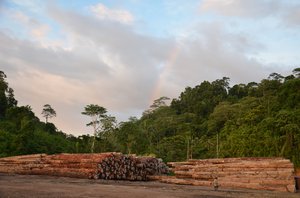
Under the rainbow: a fallen gold
How to steal a forest
The Manus venture - officially the Pohowa Integrated Agro-Forestry Project – has a murky history.
The owners of the local company who did the Maxland deal refused to meet with Global Witness to discuss the project during a recent field visit.
At some point, likely in 2017, the local landowner company’s application to clear-fell trees landed on the desk of the Manus Provincial Forest Management Committee. Its review noted the existence of local land disputes, and warned the proposed project overlapped with community conservation zones.
Those conservation areas were designated by Manus communities working with the Wildlife Conservation Society in order to conserve their birthright forests. Logging the conservation area would be a blatant violation of indigenous landowners’ rights - and the wish to preserve their forests. The provincial committee agreed and advised the PNG National Forestry Board to reject the application. But instead, in December 2017, the Board issued Maxland a clearance permit.
Papua New Guinea law demands all forest clearance projects gain approval at the provincial level. Only then is a project recommended to the National Forest Board and if a positive recommendation is upheld, then the Forest Minister endorses the project for authorization.
In this case, the Board appears to have overruled the provincial committee’s decision to reject the application and instead, issued Maxland a permit. This decision means that the company holds an unlawful clearance permit. Global Witness put these allegations to the Papua New Guinea Forestry Authority but received no response.
There are also huge question marks over the legitimacy of bureaucrats who may never have visited Manus communities to sign off the destruction of forests that these communities have protected for generations.
An official in the Manus Governor’s office admitted to Global Witness in person that the land demarcation process - by which ownership claims are checked and verified - simply never happened in this case. In a country where land ownership is crucial for rural existence, settling who owns what parcel of land is critical. This project is likely to be unlawful, as an essential element to the process - the land demarcation process - did not occur. It is impossible to confirm that the legitimate owners benefit.
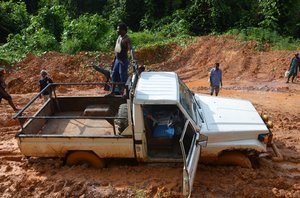
Stuck in the mud: Global Witness’s experience of Maxland roads
Conflicts of interest
Maxland appears also to have curried favour with certain local leaders in and around the affected villages. The company has gifted new houses to a number of community leaders in the area, including at least one elected ward councillor. This poses a direct conflict of interest for individuals whose motivation as public officials should be the well-being of their communities. No secret is made of this arrangement, suggesting bribery in plain sight.
Moreover, there are even more concerns about the project’s origin. The company claiming to represent local landowners who signed away the forest to Maxland, Pohowa Agriculture Ltd (PAL), has only two listed shareholders. There has been no process to identify the customary landowners of the project site, making it unclear who exactly PAL represents. Mr Kalai thought that PAL was in charge of collecting royalty payments - but did not know whether these had been paid. According to Maxland’s 2018-2019 development plan, it expected to pay out over K3.5m (£820,000) in landowner benefits in that single year (from Maxland (PNG) Limited. Annual Development Plan (2018-2019), Pohowa Integrated Agro-Forestry Project).
PAL did not respond to a request for comment.
So it was that Maxland started logging. As of October 2019, the company had exported almost 19 thousand cubic meters of timber, worth over K6m (almost £1.5m). At a log pond near Pelipowai, Global Witness photographed piles of valuable hardwood logs, cut from trees likely worth over one thousand dollars each on Chinese markets.
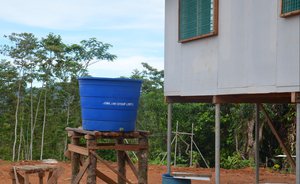
A Joinland Group water tank adorns a house gifted to a community leader
Behind the curtain
Global Witness can now reveal that Maxland is controlled by the Joinland Group, a conglomerate with interests ranging from firearms to cold storage to agriculture and forestry.
On paper, Maxland’s owner is listed a private individual. The reality is much different.
Water tanks at the Maxland logging camp are branded with the Joinland name, and Joinland documentation filed with the national Investment Promotion Authority lists the Manus site as one of its areas of operation. In his office on Manus, Maxland’s managing director admitted to Global Witness that the Malaysian Joinland Group is Maxland’s “mother company,” and two logging workers at the Maxland camp told Global Witness the same story. As we shall see, this relationship bodes ill for the people of Manus Island.
The founder of the Joinland Group is Malaysian entrepreneur Mr Hah. As of November 2019, the Joinland Group’s website was defunct, but numerous Joinland companies were listed as active on the Malaysian and Papua New Guinean corporate registries.
From frozen meat to logging cheat
The honorary title Dato’ Sri was bestowed on Thomas Hah Tiing Siu by a Malaysian sultan at the sultan’s 82nd birthday party in 2013. On a corporate registration document for Joinland Management (PNG) Limited, Mr Hah’s address is listed at a Singaporean high rise where apartments can sell for millions of dollars.
Such wealth is unsurprising, for Mr Hah has been a busy man since his humble beginnings founding a company specializing in meat cold storage in 1990. The Joinland Group described itself in 2018 as a “front-runner” in industries ranging from forest to agriculture management. Joinland Firearms, in Kuala Lumpur, advertised assault rifles and grenades. Mr Hah is also Partner for Executive Strategy at Level01, a platform to trade derivatives covering a market valued at $1.2bn with assets such as forex or cryptocurrency.
In 2016, Mr Hah was appointed as executive director at the China Assurance Finance Group Limited (CAFG), an investment holding company traded on the Stock Exchange of Hong Kong and registered in the tax haven of the Cayman Islands.
Global Witness contacted Mr Hah for his comment on the allegations contained in this article. He replied: “We deny the accusations stated in your email,” warning “an official letter” from his lawyer was forthcoming. He added: “For your information, all our projects in Papua New Guinea are granted by the National Forest Authority and proper [sic] monitored by the government. We reserve our legal rights towards any baseless and false allegations [sic] publication against the company or to myself.”
When this report went to press, no such letter had been received.
Sham plantation?
Signs that the rubber plantation is an excuse for logging are everywhere.
In October 2019, the few thousand rubber seedlings observed by Global Witness languished on the far side of the Manus Island in obvious poor health. Maxland’s managing director admitted a proposed nursery site has not yet been established, while pointing to the intended location on his hand-drawn map. Using the map, he showed Global Witness that its planned location is not even inside the area allocated to Maxland. At minimum the company would need a new permit both to clear forest for the purported nursery and to build an access road, conveniently resulting in still more logging.
The Memorandum of Agreement for the project between Maxland, the PNG Rubber Board and the Manus Provincial Government committed the Malaysian company to planting between three and five million rubber trees. According to the company’s development plan, it meant to plant 1,333 hectares of rubber in the 2018-2019 operational year. Yet Global Witness analysis of satellite imagery of the project area found less than 100 hectares of clearance as of January 2020. Meanwhile, Global Witness analysis also suggests that extensive selective logging of valuable trees has been carried out within about 1,000 hectares of the project area.
In emails to Global Witness, Josephine Kenni, head of the National Rubber Board, said Maxland had “violated our laws” and was “not working with our project plan”. However, she said some of the seedlings observed by Global Witness had since been planted, and 60,000 more were expected to arrive from Malaysia by late May, 2020. Asked repeatedly to confirm how many had been planted, Ms Kenni said she was unable to contact anyone on Manus to confirm. Global Witness was able to telephone Mr Kalai, who reported that no rubber had yet been planted at the project site.
Despite failing to deliver rubber plantations, Maxland has begun preparing to “reforest” some of the clear-felled site with some native species. Replanting is arguably better than leaving the site barren. But rainforests may take centuries to develop their full biological richness after logging—if they can recover at all. And this course of action completely undermines claims that clear-felling was only done to facilitate a rubber plantation.
Extensive infrastructure has arisen to support Maxland’s logging operations. The company has constructed a wharf so barges can collect logs and transport them to cargo vessels. Just inland, a huge logging camp has sprung up, with housing for staff and its own garage and petrol station to serve the company’s fleet of trucks.
Meanwhile, skidding tracks branch off the mud road to the alleged plantation sites in both directions. These spurs, left by logs hauled from the forest, are the unmistakable mark of selective logging, according to a former independent forest monitor. What roads have been created remain unfinished: even before the rainy season commenced, the truck Global Witness rode in became stuck in rust-red mud. This track will be of little use to communities after a season of heavy rain.
Finally, trees appear to have been felled far wider than the 20 meters to either side of the center of the road permitted legally. This is yet another violation of PNG law.
Maxland’s activities on Manus appear to have breached the law numerous times.
It is arguable that some of Maxland’s activities constitute criminal offenses.
A warning from history
Unfortunately, for the inhabitants of Pelipowai, the best indication of future performance is past behaviour. Global Witness is no stranger to the modus operandi of Joinland, Maxland’s controlling company.
In 2007, three agricultural leases were issued by the government covering nearly 80 percent of the island of New Hanover, in New Ireland Province. Logging was contracted to Joinland (PNG) Ltd. Like the Maxland project, these were intended to be used for agriculture and allowed for wholesale forest clearance. A government commission of inquiry into the issuance of these types of leases stated that due diligence had not undertaken and described local landowners as “totally unaware” of the project.
In 2017, Global Witness investigators documented those leases. No rubber whatsoever was exported from the New Hanover operation.
The rubber board’s Josephine Kenni told Global Witness the trees planted were the wrong variety. Local activist and former elected official John Aini described the operation in November 2019 as “chaos”. In February 2020, Mr Aini told Global Witness: “No one really cared if the rubber trees would grow; it was the logs they wanted.” He continued: “Our river system can no longer support livelihoods - undrinkable, no fish life – it’s difficult to catch fish and our people, especially children, continue to develop ulcers and other illnesses due to the devastated river.”
Ultimately, timber worth over $50 million has been exported from the New Hanover project.
Most of the inhabitants of New Hanover got next to nothing in return for the project’s catastrophic damage to their environment. Researcher Jason Roberts, who lived on New Hanover, wrote in 2019 that their hardships were “all the more frustrating considering what the project had amounted to so far - a little money, some cheaply made infrastructure, [and] a lot of social and environmental change...”
Global Witness considers the business model of Maxland and its controlling company Joinland to be built upon agriculture bearing hallmarks of a sham. Every indication is that the Manus project is similar. By all appearances, there is no serious intention to develop a rubber plantation, and the project is designed to abscond with timber worth millions while leaving local communities to cope with the environmental and social fallout.
China is PNG’s single largest timber buyer. In 2019, Chinese companies bought 86% of the millions of cubic meters of timber PNG exported that year.
Global Witness has previously documented the legal and reputational risk this poses to China’s wood product industry. As one of the top importers, manufacturers and exporters of wood products globally, China’s timber purchases have an outsized impact on the world’s forests.
China’s recently revised Forest Law could provide an opportunity to crack down on the trade in illegally harvested timber. For the first time it makes clear that no-one should purchase, process or transport illegally produced timber - it is now crucial to clarify that this includes timber sourced overseas.
Tackling China’s role in the trade in illegally harvested timber could make a significant contribution to the protection and sustainable development of the world’s forests, the conservation of global biodiversity and meeting the challenge of climate change.
A document obtained by Global Witness shows that Maxland’s customers in 2019 included Ningbo Hong Guang Decorate Materials Co. Ltd of China and the Japanese Sojitz Corporation.
Global Witness has previously reported on these companies’ willingness to source timber from clearance operations in PNG at high risk of being illegal.
In 2017, Sojitz told Global Witness it would “not handle wood obtained through illegal logging” and would “seek to mitigate any negative impact” on human rights. Challenged over its Manus purchase, Sojitz said it was working with individual suppliers to improve wood procurement in line with its Wood Procurement Policy. The company said it would not buy from Maxland again. Ningbo Hong Guang did not respond to a request for comment.
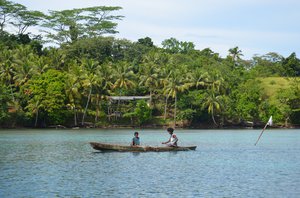
Residents of Manus Island navigating coastal waters in an outrigger canoe.
This destruction does not stop at the shoreline. On the speedboat from Lorengau, a skipper showed Global Witness’s team a bank of giant clams, cultivated by coastal communities for food. The clams and fish thriving on nearby coral reefs are another important source of protein for islanders. But deforestation causes erosion, muddying rivers that then smother coral reefs with silt. Global Witness observed silt disgorging from a river downstream from the Manus logging area.
Not all are affected equally by such environmental devastation. In Papua New Guinea, women bear a disproportionate burden. They typically do the lion’s share of gardening and produce most of the country’s crops, while also taking care of children. For rural women like those in Manus’ South Coast, these demands are made considerably more difficult when their natural environment is devastated.
Protests and violence
On Manus, the project has already led to strife. At the public meeting attended by Global Witness the village’s frustration was palpable. “All these land issues were not being in place before the company arrived,” Mr Kalai reflected.
Another Manus landowner claimed he was assaulted with a plank by three police officers after protesting over Maxland logging his land. “I was asleep,” he told Global Witness. “They woke me up with their beatings. They were swearing at my mum and sisters.” He continued: “I was 23 days in jail. I was not given a medical check-up in the cell. I [now] have problems with my shoulder and my hand.”
The police’s account differs. Two officers at Lorengau Police Station told Global Witness the man had been drinking when he went to attack the logging camp manager, and went on to assault a police officer before being charged with both attacks.
It is impossible for Global Witness to verify what actually happened. Even if the police testimony is accurate, that he saw fit to attack the camp manager is indicative of the hostility Maxland’s project has aroused.
At the Maxland operation, a police cabin is situated within the logging camp. As Global Witness has reported, logging companies frequently use PNG police as private security. This raised such concern that in 2016 the National Police Commissioner warned: “Permanent deployment of police to logging camps is not permitted.”
Yet Lorengau police admitted that their station was “paid for by logging companies”, such as Maxland. The logging companies also pay for boat fuel and logistics for other police visits, one officer told Global Witness. Police are meant to serve and protect the citizens of Papua New Guinea, not foreign logging companies. PNG’s Minister of Police did not respond to the allegations.
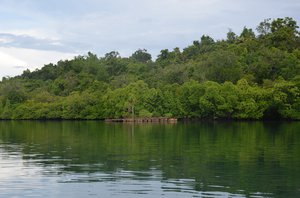
World War Two detritus is everywhere on Manus. Yet it remains a hotspot of biodiversity.
Where there’s muck, there’s money
It might be tempting to view all of this as the actions of one rogue corporation playing to different rules. In fact, what Global Witness has documented on Manus Island goes to the heart of the international financial system – which must take responsibility. Companies engaged in deforestation rely on credit, loans and financial services from major banks. Were this financial lifeline cut off, the harm they cause could be curtailed. But, as Global Witness has documented, financial institutions often show scant regard for deforestation risks.
This investigation has traced the flow of finance into the Joinland Group from Malaysia, Singapore, Norway and the US.
Between 2011 and 2016, Joinland Capital SDN. BHD. – a company owned by Mr Hah – held financial relationships with Malayan Banking Berhad (Maybank), CIMB Bank Berhad, and United Overseas Bank (Malaysia) BHD (UOB). Together these banks provided financing to Joinland Capital worth over £3m, according to the Companies Commission of Malaysia as of November 2019.
Maybank told Global Witness: “…[W]e are unable to confirm or discuss any alleged banking relationships we may have or have had.”
United Overseas Bank also cited client confidentiality, stating that it was unable to comment on client relationships. However, it referenced its 2016 Responsible Financing Policy that prohibits the financing of companies involved in illegal logging, and where their operations threatened forests of high conservation value or resulted in unacceptable social impacts.
CIMB Bank did not reply to multiple requests for comment.
Joinland is far from the only harmful company that United Overseas Bank, Maybank, and CIMB have reportedly financed. As recently as last year, UOB allegedly provided financing for palm oil plantation expansion in Malaysian Borneo. The CIMB Group has reportedly provided nearly $2 billion to the palm oil sector in just the last five years. And Malayan Banking is the world’s single largest financier of the palm oil sector, according to a 2018 report by environmental non-governmental organization TuK Indonesia and consultancy Profundo. Against this background, investors in these banks ought to carefully screen the banks’ activities for evidence they have financed deforestation.
But the money trail does not end there, as international financiers have invested in these banks.
Global Witness analyzed the shareholders of these banks in February 2020 and found that the manager of Norway’s Government Pension Fund Global, one of the world’s largest funds, which has publicly divested from several companies over deforestation concerns, is among the top 20 shareholders of all three banks.
So is BlackRock - the world’s largest asset manager, controlling close to $7 trillion. BlackRock recently made headlines in the global financial press. It belatedly acknowledged the critical risk climate change poses to their customers’ profit, and promised to begin exiting investments with high sustainability-related risks.
Other major financial backers of these Malaysian banks include the mega-funds The Vanguard Group, Inc., J.P. Morgan Asset Management (Singapore) Limited, T. Rowe Price Associates, Inc., Dimensional Fund Advisors of Texas and the California Public Employees’ Retirement System (CalPERS). As of the time of our analysis, these financial institutions owned hundreds of millions of dollars in these banks.
The Norwegian Pension Fund’s manager declined to provide information on its engagement with individual companies. But a spokesman said: “We have published climate change and human rights expectations of the companies we invest in. We expect companies engaged in activities with a direct or indirect impact on tropical forests to have a strategy for reducing deforestation from their own activities and from their supply chains.” The fund manager said that it had urged banks in Southeast Asia to strengthen due diligence and to report on climate and deforestation risks.
The Vanguard Group did not respond to the allegations, but said it would incorporate Global Witness’s perspective into its “ongoing analysis with the companies in question.”
T. Rowe Price said it did not comment on specific investments, but claimed environmental and social factors were “key considerations” in its investment approach, and that its investment screening process considers factors including land use, corruption, and bribery.
J.P. Morgan Asset Management (Singapore) Limited, CalPERS, BlackRock, and Dimensional Fund Advisors did not respond to Global Witness’ request for comment.
From the urban jungles of Wall Street and Singapore, and back on Manus. What might the future hold for Pelipowai and its neighbouring villages? One thing seems clear: hopes pinned on Maxland will lead to disappointment and betrayal. Instead, a ploy played out across Papua New Guinea is repeated once again. Precious forests are lost forever, for miniscule rewards.
To Mr Kalai, the prospect of the potential road the community wants appears bleak.
RECOMMENDATIONS
Government of China
- China should clarify that the revised Forest Law applies to timber imports and ensure that it is effective in tackling the imports of illegal timber from countries like PNG. Failing that, the Chinese government should require all timber importers to carry out due diligence to minimize the risk that they import timber produced in violation of source country laws. These due diligence policies and procedures should not rely solely on official documents as proof of legality but should require importers to investigate and verify the conditions under which the timber was cut. The policies and procedures should be made public.
- Chinese timber importers, processors and timber industry associations should undertake thorough due diligence to prevent illegal timber entering into their supply chain and ensure they are not acting in violation of the newly revised Forest Law or other mandatory measures, in particular where there is a high risk of illegality such as in countries like PNG.
Government of Papua New Guinea
- The PNG government should immediately place a moratorium on issuing all new logging and forest clearance permits.
- The PNG government should place a moratorium on all existing logging and clearance operations and review the issuance of their permits and the operations themselves for legal violations. Permits found to have been issued illegally should be cancelled.
- The PNG government should hold those responsible for breaking the law to account, by investigating, prosecuting, and fining and/or jailing directors, officers, and companies involved. It should also attempt to reclaim the proceeds of any timber deemed to have been cut illegally and establish a mechanism to return these funds to affected landowners.
- The PNG Forest Authority should create a publicly accessible electronic system of documents related to the issuance and oversight of logging and clearance permits and operations, including verification of landowner consent and findings from the agency’s checks on operations. This will allow landowners to monitor how their own land is being used and challenge any unauthorized uses, and also facilitate thorough due diligence by timber buyers.
Global finance
- Financiers and lenders to the Joinland Group and its subsidiaries should publicly investigate, and report on, whether through this business relationship they have been exposed to profiting from apparently illegal logging and environmental destruction.
- Investors should publicly state how they address the risk of holding tens of millions of dollars of investment with banks and financiers with widely reported exposure to local regions and sectors with widespread illegality risks linked to deforestation, including PNG.
- Governments should address the role of businesses headquartered, domiciled or operating within their countries in fuelling global deforestation. This should start by enacting policies and laws that require companies, including financial institutions, to undertake mandatory due diligence to identify, mitigate, prevent and report on risks of deforestation, environmental harm and human rights abuses.
Find out more
You might also like
-
Briefing Strengthening corporate responsibility
The case for mandatory due diligence in the EU to protect people and the planet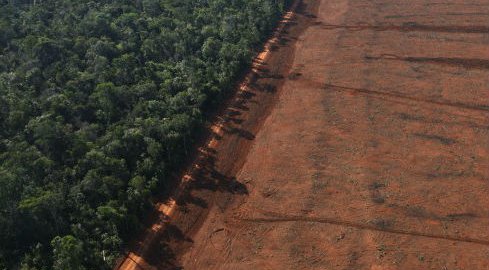
-
Report Stained Trade
We followed the 9,000-mile journey of rainforest timber from Papua New Guinea, where illegal logging is rampant, through China to the U.S.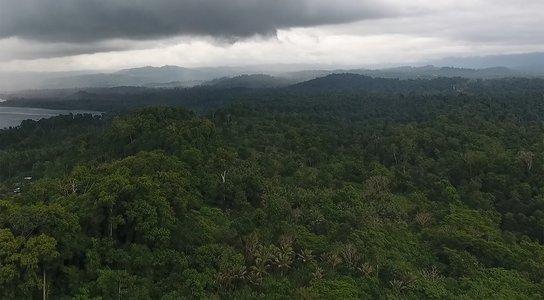
-
Article Money to Burn
More than 300 banks and investors back six of the world’s most harmful agribusinesses to the tune of $44bn